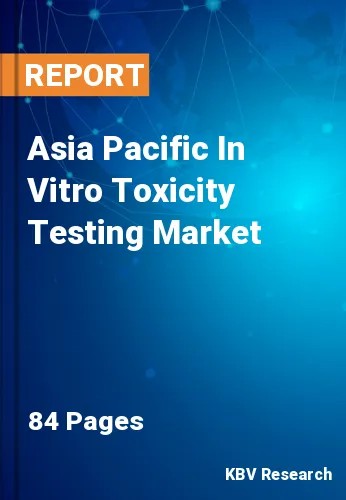The Asia Pacific In Vitro Toxicity Testing Market would witness market growth of 11.6% CAGR during the forecast period (2022-2028).
The availability of various tools in the biotechnology and bioinformatics divisions for conducting in-silico simulations on animal models is also a factor in industry influence. In addition, the growth of toxicology databases for the in-silico study of various chemicals is expected to drive demand for in-vitro procedures, resulting in industry advancement.
Market stability is projected to be enhanced by significant government research funding combined with clear reimbursement rules to build automated and technically sophisticated lab tests and ex-vivo studies equipment.
To uncover the essential routes and elements of these regulatory mechanisms in the reactions to toxin exposure, in vitro toxicity testing should be based on a thorough knowledge of the physiological processes associated with toxicological endpoints. Based on previous carcinogenicity research, the number of significant pathways is predicted to be in the tens to hundreds.
PMDA is responsible for the management of medicines and medical equipment in Japan. PMDA undertakes scientific assessments of marketing permission applications for pharmaceuticals in collaboration with the Ministry of Health, Labour, and Welfare's Pharmaceutical and Food Safety Bureau to monitor their post-market safety. To set testing standards for medical equipment, the International Organization for Standardization (ISO) rules are employed (FDA, 2016b). The GPMT, Buehler testing and LLNA are all accepted methods for medical device skin sensitization testing. However, comparable non-animal tests for pharmaceuticals and medical devices have yet to be accepted by the PMDA.
The South Korean Pharmaceutical Affairs Act covers a wide range of issues concerning pharmaceuticals in South Korea. Risk and ef?ciency assessments for pharmaceuticals intended for human use are handled by the National Institute of Food and Drug Safety Evaluation, which is part of the Ministry of Food and Drug Safety in South Korea. Remedies, herbal medicines, quasi-drugs, and biological materials applied directly to the skin or mucosae have all been tested for sensitization potential.
The China market dominated the Asia Pacific In Vitro Toxicity Testing Market by Country in 2021, and would continue to be a dominant market till 2028; thereby, achieving a market value of $2,771.8 Million by 2028. The Japan market is anticipated to grow at a CAGR of 11% during (2022 - 2028). Additionally, The India market would exhibit a CAGR of 12.3% during (2022 - 2028).
Based on Type, the market is segmented into Absorption, Toxic Substances, and Dose. Based on Technology, the market is segmented into Cell Culture Technologies, High Throughput Technologies, and Toxicogenomics. Based on End User, the market is segmented into Cosmetics & Households Products, Pharmaceuticals Industry, Food Industry, Chemicals, and Industry. Based on countries, the market is segmented into China, Japan, India, South Korea, Singapore, Malaysia, and Rest of Asia Pacific.
Free Valuable Insights: The Worldwide In Vitro Toxicity Testing Market is Projected to reach USD 37.5 Billion by 2028, at a CAGR of 10.8%
The market research report covers the analysis of key stake holders of the market. Key companies profiled in the report include Thermo Fisher Scientific, Inc., General Electric (GE) Co., AstraZeneca PLC, Catalent, Inc., Laboratory Corporation of America Holdings, Acacia Pharma Group Plc, GlaxoSmithKline PLC, Helsinn Healthcare SA., and Heron Therapeutics, Inc.
By Type
By Technology
By End User
By Country
Our team of dedicated experts can provide you with attractive expansion opportunities for your business.

